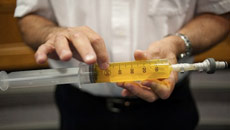A research has found that drugs widely used to treat lung diseases like asthma or pneumonia work better with the body clock.
Once the ancient rhythm of our body clock is disturbed owing to artificial light, shift work and jet lag, medication to treat asthma and pneumonia can become ineffective, scientists said.
The research led by professors David Ray and Andrew Loudon from University of Manchester found that cells lining the lung airways have their own body clock which is the time-keeper for lung inflammation -- both conditions cause swelling in the lungs.
Researchers further discovered that more severe lung inflammation happens as a result of the loss of the body clock working in these cells.
"We found a key molecule known as CXCL5 that facilitates lung inflammation which is a key regulator of how immune cells get into tissues. The loss of CXCL5 completely prevents the time of day regulation of lung inflammation which opens up new ways to treat lung diseases," Loudon said.
During the research, the team uncovered how glucocorticoid hormones from the adrenal gland are vital in controlling the level of inflammation in the cells lining the airway.
"This hormone works through the glucocorticoid receptor, a major regulator of gene expression. We wanted to find out, therefore, if glucocorticoid medicines would also show a time of day effect. Our research shows they do," Ray added.
The team concluded that the rhythm of the clock in the lining of the cells in the lungs is important for lung diseases like asthma, and chronic obstructive pulmonary disease.
Our bodies anticipate the change from day to night by having an internal, or circadian clock.
This explains why it is hard to adjust to shift work.
The body clock regulates sleep but now has been discovered to also regulate our immune system.
The findings were published in the journal Nature Medicine.





